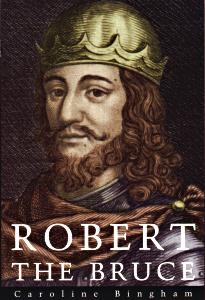Scots who know their history would tell you that it's Robert the Bruce (a.k.a. Raibeart Bruis), the man who led the Scots to victory in the Wars of Independence.
 Robert the Bruce claimed the Scottish throne as a great-great-great-great grandson of David I of Scotland, and would become one of Scotland's greatest kings and warriors. Initially, he was primarily concerned with restoring his family to the Scottish throne, and in 1296 he and his father swore allegiance to Edward I of England against John Balliol, King of Scotland and the Bruces' great rival. However, it was not long before Robert put himself in breach of his oath and joined the Scottish revolt the following year. He and other rebels began to destroy the lands owned by those sworn to Edward, but later that year were forced to sign a treaty in return for a pardon from the English king.
Robert the Bruce claimed the Scottish throne as a great-great-great-great grandson of David I of Scotland, and would become one of Scotland's greatest kings and warriors. Initially, he was primarily concerned with restoring his family to the Scottish throne, and in 1296 he and his father swore allegiance to Edward I of England against John Balliol, King of Scotland and the Bruces' great rival. However, it was not long before Robert put himself in breach of his oath and joined the Scottish revolt the following year. He and other rebels began to destroy the lands owned by those sworn to Edward, but later that year were forced to sign a treaty in return for a pardon from the English king.Apparently, Robert's loyalty wavered for a time, as he again began working toward Scottish independence behind Edward's back. Then in 1302, Robert and some of the other nobles officially submitted to Edward, reasoning that they could no longer in good conscience sacrifice the lives of their countrymen for John Balliol.
In 1303, Edward made his seventh invasion into Scotland and was this time successful, overpowering the Scots as far north as Moray before returning to the Lowlands, the entire country now under submission. But Robert and his friend William Lamberton had witnessed their countrymen's heroic efforts during the siege of Stirling Castle, and they made a pact to Scottish patriotism and achieving Scottish independence.
However, Robert's staunch belief in his family's right to the throne nearly compromised their plan. Toward the end of 1305, a serious rival presented itself in the form of John Comyn. As the nephew of John Balliol, his loyalty to the Scottish cause had never wavered. Robert needed to eliminate this threat, so he and some friends attacked and killed Comyn on February 10, 1306. His rash action meant he either had to become a fugitive, or claim the crown. He chose the latter and was crowned King of Scots on March 25 by the MacDuff Earls of Fife. He was now a king without a kingdom, as Scotland was still under the control of Edward.
When Edward I died in 1307 he was succeeded by his son Edward II, a feeble man whose shortcomings as a leader were in Robert's favour. Only a year and a half later, Robert had reclaimed all of Scotland north of the River Tay through his prowess on the battlefield. The Lowlands proved more difficult, but they slowly took castle after castle, and the Scots won their independence at the Battle of Bannockburn in 1314 under Robert's leadership. To secure their safety, Robert proceeded to launch raids into England, eventually causing Edward II to sue for peace.
Under Robert, Scottish independence was further enforced by the Declaration of Arbroath of 1320, and the Treaty of Edinburgh-Northampton signed by Edward III of England in 1328 which recognised Scotland as an independent kingdom and Robert the Bruce as its king.
More information on Robert the Bruce can be found here and here.
How very, very cool!!
ReplyDeleteIts amazing that Mel Gibson could turn a great warrior king into a feeble sissy in a movie. But then, Gibson has never had that great of a grasp on history. What does that say about his religious bloodbath?
ReplyDeleteAnd to think the whole thing in Scotland came about because a little girl from Norway drowned during an ill-concieved winter boat trip.
hehe, I know history too :D
I still think it's funny that I learned about Robert the Bruce from Space:1999. Verily, a wonderful, educational post!
ReplyDeleteNanner - thanks! I found it quite interesting.
ReplyDeleteMike - no kidding! The bloodbath, I haven't seen. Don't really want to. I didn't know about the little Norwegian girl, though...you'll have to tell me about that. :D
Spc - that IS funny! thanks.
You've never heard of the Maid of Norway who was a direct grandchild (or great grandchild perhaps) of the last uncontested Scottish king before Bruce, who was to marry someone and make them king, but who died because she was a sickly child and the PUT HER ON A FREAKING BOAT IN WINTER!!!!
ReplyDeleteCourse there are those who think that Rob Roy MacGregor was the truest and greatest Scot of all. I mention him but of course he's only incidentally my ancestor... :D
ReplyDelete